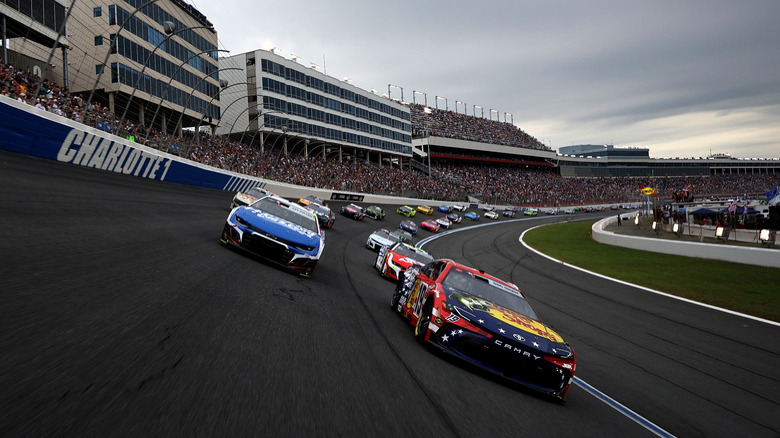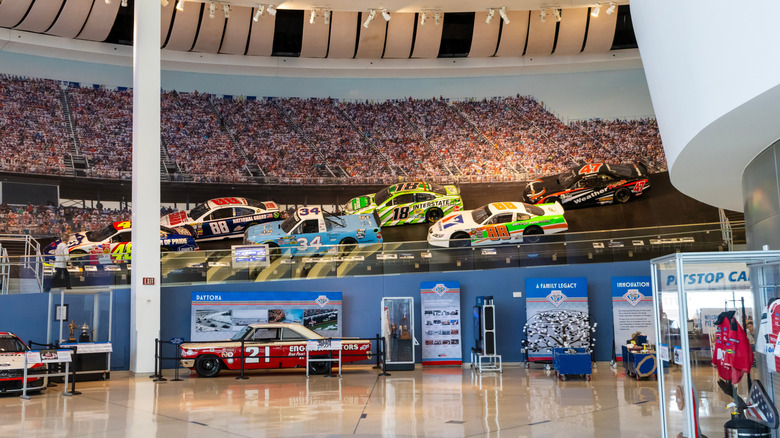Why North Carolina Is The Spiritual Home Of NASCAR
It's ironic that while North Carolina is considered the spiritual home of NASCAR, the motorsport is neither headquartered in the state nor was it originally founded there. Both of those distinctions belong to Florida, where in December of 1947, William "Bill" France Sr. gathered like-minded racing enthusiasts at the Streamline Hotel in Daytona Beach and outlined the rules, sanctions, and governing body of what would become the National Association for Stock Car Auto Racing. The first official NASCAR race was held on February 15, 1948, on the road course at that very same beach.
But if you know anything about NASCAR, you know its origins didn't start on some sandy strip of coastline in Florida, but on the dirt backroads of the south, where during Prohibition, moonshiners routinely ran their homemade liquor far and wide in automobiles souped up with more powerful engines so they could outrun the local constabulary. Back in the day, Wilkes County (just north of Charlotte) was regarded as the moonshine capital of the United States.
Of the 52 races run during that first NASCAR-sanctioned season, 30 were held in North Carolina, with all manner of brands most fans probably had no idea even competed in NASCAR. Then, in June 1949, the Charlotte Fairgrounds Speedway became home to the first NASCAR "Strictly Stock" race, which is now the NASCAR Cup Series. Many of the race teams are headquartered in the greater Charlotte area, and the NASCAR Hall of Fame is located in Uptown Charlotte. Basically, you wouldn't have NASCAR without North Carolina, making it the spiritual home of the venerable motorsport.
Race day warriors consider the Tar Heel state home of NASCAR Nation
North Carolina remains home to four tracks (none of which fans consider the worst track in NASCAR). The North Wilkesboro Speedway was one of the sport's original tracks, holding its first race in 1949. The quarter-mile oval at Bowman Gray Stadium (aka "The Madhouse") in Winston-Salem is NASCAR's oldest weekly track, also operating since 1949. Dating back to 1965, Rockingham Speedway (the "Rock") isn't as old as those two, but it's famous for its uniquely rough surface that requires extreme tire management. Last but not least, the crown jewel – Charlotte Motor Speedway, the 1.5-mile intermediate track that not only hosts the 600-mile marathon that is the Coca-Cola 600 each Memorial Day, but also converts into the 2.32-mile Roval road course.
After NASCAR entered its "modern era" in 1972, it dropped many of the short tracks throughout the Carolinas. Those still operating in North Wilkesboro, Rockingham, and Charlotte each hosted two races per year, giving North Carolina a total of six races every season. Meanwhile, surrounding states like Tennessee (with tracks in Bristol and Nashville), Virginia (Richmond and Martinsville), Georgia (Atlanta), and South Carolina (Darlington) were only privy to two races.
As the sport progressed into the 1990s, the relatively small region (by West Coast standards) still hosted almost half of each season's races (16 to 18), so it made sense for teams to set up their facilities locally. With North Carolina situated firmly in the middle, and Charlotte being the largest city in that area, it became the "Home of NASCAR" to both the sport and its legion of fans alike.

